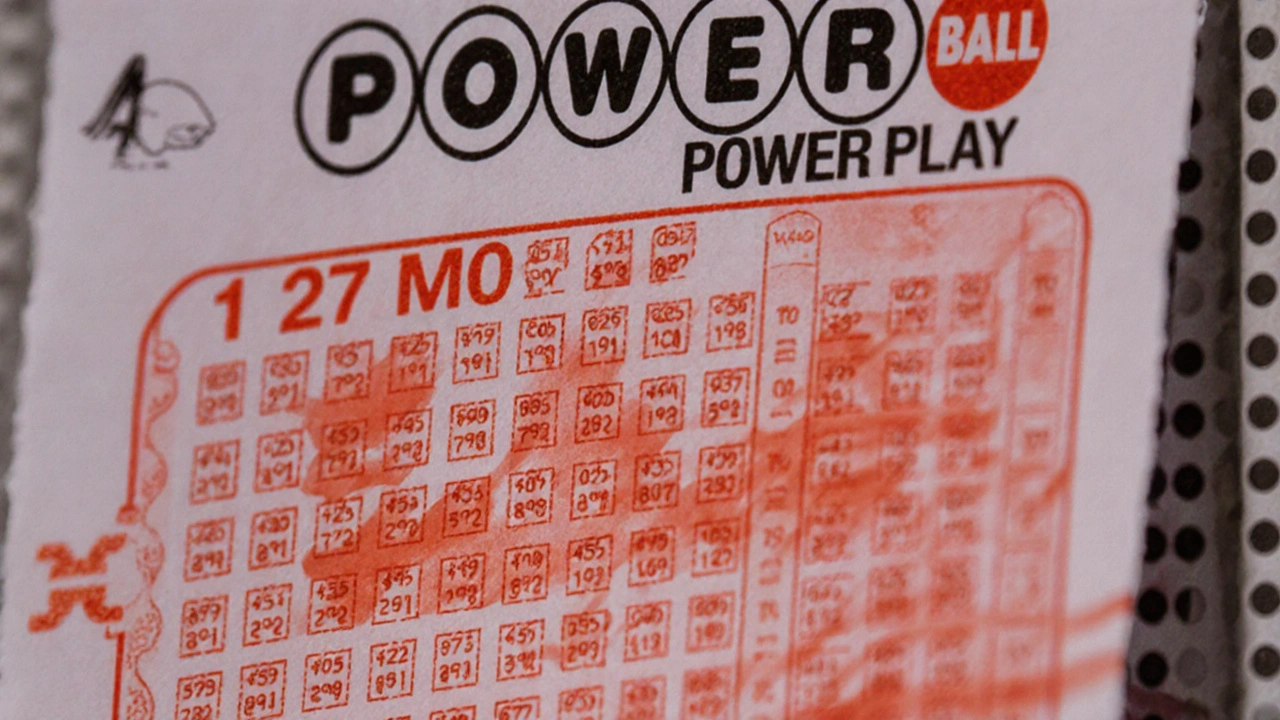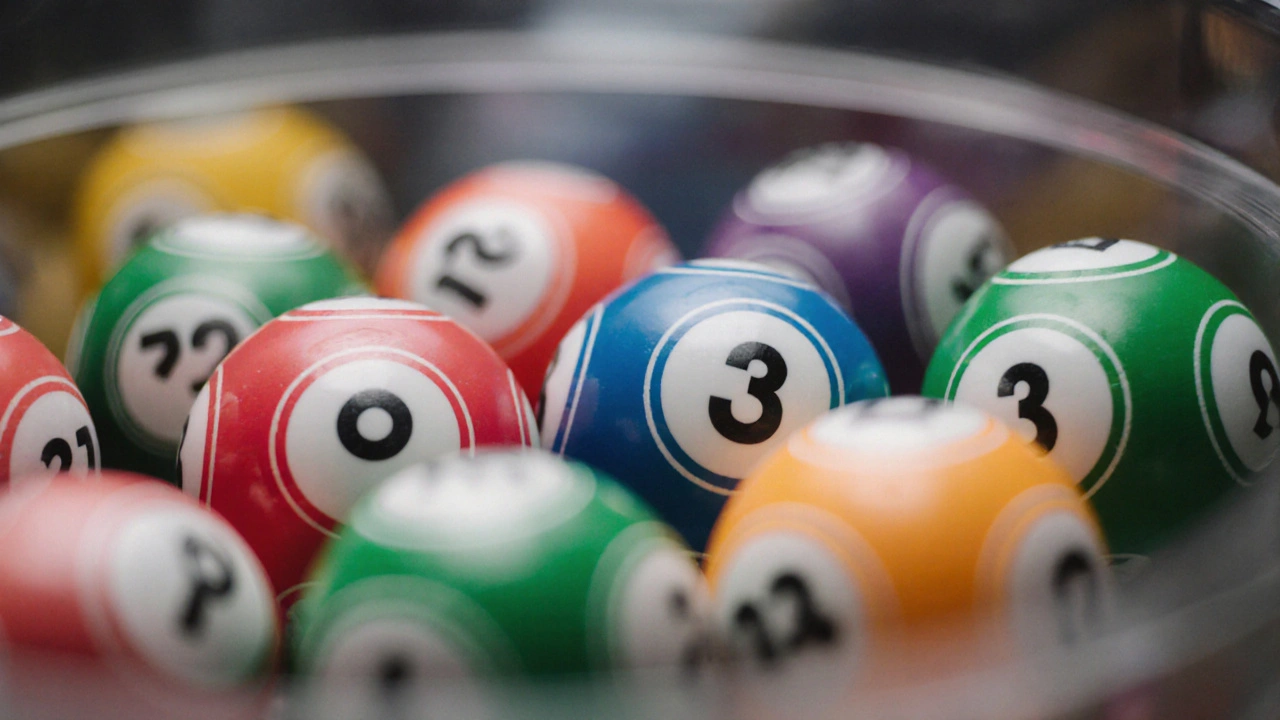Wednesday's draw: numbers, winners and payouts
The Powerball draw on September 24, 2025, delivered another roll‑over after none of the 123 million tickets sold matched all six numbers. The winning combination was 15, 31, 45, 49, 53 plus the Powerball 19, and the Power Play multiplier was set at 3×. The cash option for the $127 million jackpot sits at $59 million.
While the grand prize remained elusive, the night still produced a notable story: a lone ticket purchased in California matched five of the six numbers, snapping up the $1 million prize for a Match‑5 win. That was the only ticket nationwide to achieve a five‑number match.
Beyond the big win, more than 380,000 tickets earned smaller payouts. The breakdown looks like this:
- 13 tickets – four numbers plus Powerball – each received $50,000
- 214 tickets – four numbers only – each received $100
- 581 tickets – three numbers plus Powerball – each received $100
- 15,075 tickets – three numbers only – each received $7
- 12,625 tickets – two numbers plus Powerball – each received $4
- 101,850 tickets – one number plus Powerball – each received $4
- 249,765 tickets – Powerball only – each received $4
Overall, the night generated $2.9 million in prize payouts, a modest slice of the total pool compared with the jackpot that continues to climb.

What’s next for the Powerball jackpot?
With no winner on Wednesday, the prize rolls over to the next scheduled drawing on Saturday, September 27, 2025. Forecasts put the new jackpot at roughly $145 million, with a cash option of $67.4 million. The increase follows a hot streak that began after the historic $1.787 billion split on September 6, when players from Missouri and Texas split the second‑largest Powerball prize ever.
Powerball draws occur three times a week—Monday, Wednesday, and Saturday—at 10:59 p.m. ET. Ticket sales close somewhere between 9:59 p.m. and 10:00 p.m., depending on state regulations. As the jackpot swells, many states report a surge in ticket volume, with online sales and quick‑pick options seeing the biggest uptick.
Analysts say the growing jackpot fuels what they call a "lottery fever," prompting casual players to try their luck and seasoned players to increase their wager size. The Power Play multiplier, which can boost non‑jackpot prizes by up to 5× when selected, also adds to the allure.
Whether the $145 million prize will finally break the streak remains to be seen, but the combination of escalating stakes and a national audience makes each draw a major event for both small‑town ticket sellers and the broader gambling market.

16 Comments
NARESH KUMAR September 27 2025
Wow, another roll‑over! 🎉 The excitement keeps building and it’s great to see folks staying hopeful. Even if you didn’t win, the smaller prizes still add up and keep the buzz alive. Good luck to everyone buying tickets this weekend! 😊
Purna Chandra October 4 2025
The audacious ascent of the Powerball jackpot reads like a modern epic, each increment a stanza in a capricious ballad of chance. One cannot help but marvel at the statistical choreography that propels $145 million toward an inevitable climax, as if the universe itself were conducting a lottery of destiny. Yet, beneath the glittering veneer lies a labyrinth of fiscal engineering, a clandestine consortium of state treasuries that thrive on the public’s perpetual hope. It is, frankly, an elegant exploitation of human optimism, a cleverly masked form of voluntary taxation. Observe how ticket sales surge in tandem with each roll‑over, a phenomenon that economists term “lottery fever,” but which I argue is a manifestation of collective gullibility. The Power Play multiplier, offering up to five times the non‑jackpot prize, only amplifies the siren call, enticing even the most seasoned gamblers to gamble beyond reason. When you consider that a solitary California ticket secured a cool million for a Match‑5, you recognize the tantalizing proximity of fortune that lures the masses. Still, the probability of nabbing the grand prize remains infinitesimal, a ratio so dismal it borders on the absurd. In that context, the $59 million cash option appears as a pragmatic compromise, a sobering reminder that the glitter is often a façade. Moreover, the logistical orchestration of nightly draws-precisely timed, impeccably monitored-conveys an aura of legitimacy that belies the underlying randomness. Some skeptics whisper about algorithmic manipulation, suggesting that the draw outcomes may be subtly steered to sustain public interest and revenue streams. While such conjectures lack concrete evidence, they do underscore the necessity of vigilant oversight. Ultimately, the Powerball phenomenon serves as a mirror reflecting society’s paradoxical relationship with risk, reward, and the illusion of control. Whether the forthcoming Saturday draw will finally crack the code remains to be seen, but the narrative continues to captivate. In sum, the jackpot’s relentless climb is both a statistical marvel and a cultural artifact, worthy of both admiration and critique.
Mohamed Rafi Mohamed Ansari October 11 2025
Dear colleagues, the recent Powerball roll‑over offers a compelling case study in probabilistic modeling. The absence of a jackpot winner on September 24th underscores the inherent stochastic nature of the game. As documented, the winning combination comprised 15, 31, 45, 49, 53, and Powerball 19, a configuration that, while statistically improbable, is not unattainable. The cash option of $59 million represents a significant liquidity injection for those who elected that alternative. Furthermore, the distribution of ancillary prizes, ranging from $4 to $50,000, illustrates the tiered reward structure designed to sustain participant engagement. It is noteworthy that a solitary ticket in California secured the $1 million Match‑5 prize, emphasizing the variance inherent in outcome distributions. Analysts might consider employing Monte Carlo simulations to forecast future roll‑overs based on ticket sales velocities. In conclusion, while the jackpot continues to amass, the fundamental principles governing the draw remain constant, and participants should remain cognizant of the odds involved.
अभिषेख भदौरिया October 18 2025
In contemplating the ever‑growing Powerball jackpot, one is reminded of the ancient allegory of the ever‑receding horizon. Each roll‑over expands the promise of wealth, yet also invites reflection upon the true value of hope and anticipation. The solitary Californian ticket that secured a million dollars for a mere five‑number match serves as a beacon of possibility amidst statistical improbability. Let us celebrate not only the eventual winner, but also the collective optimism that fuels these draws. May the forthcoming Saturday drawing bring both excitement and a reminder that fortune favors the bold, however briefly.
Nathan Ryu October 25 2025
The relentless pursuit of lottery riches often masks a deeper societal issue: the temptation to seek quick fixes over hard‑earned stability. While a $145 million jackpot dazzles, it also distracts from the systemic challenges that many face daily. It is incumbent upon us to consider where our aspirations truly lie and whether chasing the Powerball is a harmless pastime or a subtle exploitation of vulnerable hopes. Remember, genuine fulfillment often stems from sustained effort, not fleeting windfalls.
Atul Zalavadiya November 1 2025
Behold, the perennial circus of Powerball, a grandiose display of chance that masquerades as a conduit for affluence. The masses, entranced by the glittering promise of $145 million, willingly consign their modest expenditures to a statistical lottery. Undoubtedly, the underlying mathematics are sound-probabilities computed with exquisite precision-yet the emotional allure is nothing short of intoxicating. One must ask: does the collective yearning for sudden wealth not betray an underlying dissatisfaction with incremental progress? In my humble assessment, the spectacle continues unabated, feeding the insatiable appetite for instant gratification.
Amol Rane November 8 2025
It is a curious sociological phenomenon that the Powerball jackpot, in its ceaseless escalation, functions as a modern mythic quest. The participants, akin to contemporary Icaruses, chase a luminous prize that hovers just beyond attainable grasp. One might argue that the allure is less about monetary gain and more about the symbolic triumph over randomness. The absence of a winner on this occasion merely prolongs the narrative, inviting further speculation about destiny's caprice.
Venkatesh nayak November 15 2025
Observing the latest jackpot surge, one cannot help but note the inexorable human predilection for risk‑laden optimism. The numbers align, the Power Play multiplies, and the crowd erupts in anticipation. Yet, beneath the surface lies a calculated economic engine, meticulously calibrated to maximize ticket sales. Indeed, the system is both elegant and insidious, a paradox that demands our attention :) .
rao saddam November 22 2025
Guys!!! This roll‑over is insane!!! $145 million up for grabs!!! Who's ready to snag that life‑changing cash??? The energy is THROUGH THE ROOF!!! Get those tickets, lock in those numbers, and let’s make history!!! No more “maybe next time”!!! This is the moment!!!
Prince Fajardo November 29 2025
Oh, look at that, another jackpot that refuses to be claimed-how original. It's almost as if the universe is playing a cruel joke on us, nudging us to keep buying tickets while the money just sits there, untouched. How thrilling, right? The suspense is practically unendurable.
Subhashree Das December 6 2025
The Powerball’s perpetual roll‑overs expose a disturbing reliance on false hope, a societal symptom of deeper financial malaise. By encouraging mass participation in a low‑probability gamble, the system perpetuates a cycle of disappointment masked as excitement. It’s a textbook case of manipulation, and the public remains blissfully unaware.
jitendra vishwakarma December 13 2025
Man, these numbers just keep climbing.
Ira Indeikina December 20 2025
While we marvel at the ever‑inflating jackpot, we should also reflect on the philosophical implications of chance versus control. The lottery serves as a microcosm of existence-random, yet we impose narratives upon it. Let’s enjoy the thrill responsibly.
Shashikiran R December 27 2025
Honestly, it's shameful how many people waste their hard‑earned money on a game with astronomically low odds. Instead of gambling on false promises, folks should invest in real opportunities that actually build wealth. This endless chase for a jackpot is a distraction from real financial responsibility.
SURAJ ASHISH January 3 2026
The jackpot keeps growing but the odds stay the same.
PARVINDER DHILLON January 10 2026
Regardless of the outcome, it's heartening to see people coming together with hope and excitement. May the next draw bring joy to everyone, winner or not. 🌟